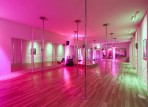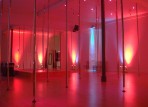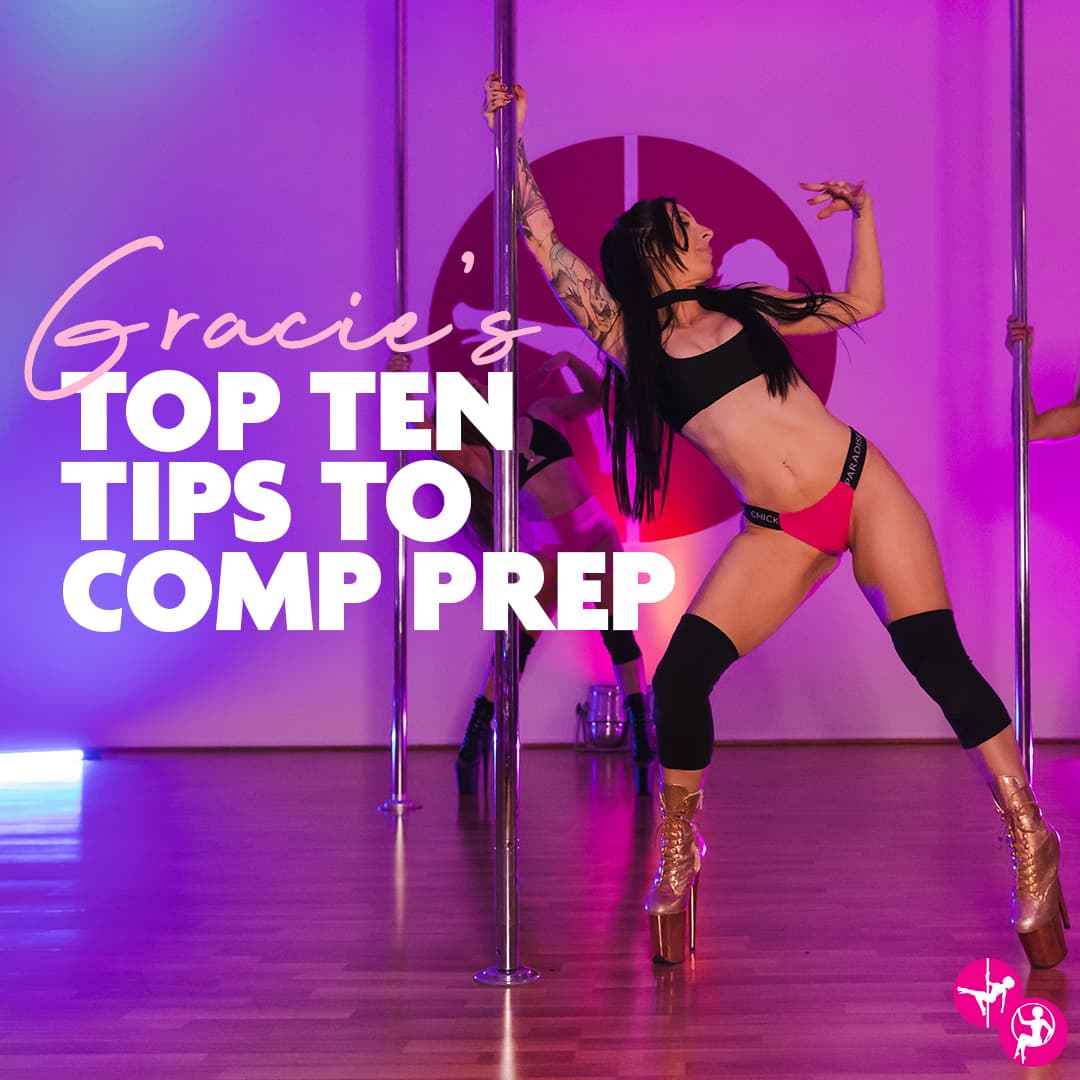Divas blogs
Select studio
SELECT STUDIO
Gracie’s top ten tips to comp prep
Comp season is in full swing and for many of us, that means countless hours of routine prep and stress! But Gracie has you covered with her top ten tips to get you prepping like a pro.
1. Which comp and why
First of all, congratulations on deciding to step out under those bright lights, whether it’s your first time or your hundredth time it deserves respect and admiration. Now, let’s see if the comp you have chosen is the right fit for you right now (I say right now because we change all the time). Is it an appropriate place and time firstly? Is it level appropriate for you? If you are unsure of this you can check out previous footage from the comp or ask your instructor or pole friends (or me!). Lastly and most importantly, is this the style of piece that you are passionate about creating right now? These days in particular competitions are desiring certain shows and champions, it is crucial to understand at this moment whether you want to develop something sexy, dramatic, artistic, athletic, tricks based, dance based, etc. by deciphering your love and skill you can enter the comps that you are most suited for! This is not to say you cannot do it all of course, but it is very important to note that it is by far wisest to bring a piece to a comp that matches the aesthetic and brief that they are projecting.
2. Scheduling and expectations
Next, sit down and have a look at your calendar. We are all so busy and having decided to fit this into your life I really recommend creating a weekly schedule and event timeline for yourself to stick to so that you are able to train properly and not feel a constant sense of rushing or that the rest of your life is falling apart as you dedicate your time to your show. Look at the time you have until the comp and aim to start work on it a couple of months before (let’s say three), put in some deadlines for when you want things done over this period such as costume done, music and concept decided, combinations finished, run through a beginning, etc. this helps you to use the length of time appropriately. Then within each week aim to pre set the times that you are training so you know exactly how many sessions you have, what they will entail, what your other training looks like, how many sessions you can fit in with your coach and anything else you feel necessary to include. So now you can head in to each week with direction and assurance that you are in control, at least as much as possible.
3. Concept or tone?
Ok now let’s have a look at your idea and at you as the artist, for this piece are you going for a concept or a tone? It is important to understand and stay true to your vision so that from lights up until lights down your audience can follow you, understand you and feel connection and continuity with your performance. Are you looking for a narrative piece that tells a story throughout? Ok, how do you ensure that you regularly check in during the performance on that narrative? Every movement must be relevant. Are you going for a character introduction that rather than a narrative is more an exploration of a character/time/place? Consider every element of your show when developing this including music, staging and choreography. Or are you more of a tonal dancer? To rather create an aesthetic with your movement, look and music? If so, ensure you remain true to it throughout and develop exactly the aesthetic you wish to cultivate and maintain it throughout your show.
4. Showcase strengths
Sounds obvious right? Again I encourage you to sit down and right down when it come to this performance what you consider your strengths and your weaknesses and then within that what you believe you need to deliver to create the show you want and fill the brief of the comp expectations. One question I ask myself and I ask my clients is: what is it that you do best? What do you know you can be confident and awesome at? The answer might be flexibility, dynamic tricks, dancing, big dramatic shows, etc. rather than comparing and freaking out about what everyone is amazing at all you need to do is ask yourself, what is it that I am awesome at? And bring that! (Can you see now why comp choice is so relevant?) showcase that strength of yours and really lean in to it. Don’t worry so much about keeping up. It is important to ensure that you have every element required even if some of them are not your best cards. Outline all the elements of the comp (strength, floor, etc) and as long as you can put a tick in each box then you are covering your bases and make sure the box you only have one tick in that you then have multiple ticks in the boxes that correspond to your strengths. This way you can remain true to yourself, enjoy your art but also fit the brief.
5. Cross training
Those who work with me know that I believe your cross training is equally important to your show training. Throughout your comp prep and regular training time it is best to work your elements individually so as not to keep assembling your tower the same way but expecting it to be sturdier, so to speak. It is important to remember that I do not expect you to train all of these things all the time, try rotating them! So choose between one and three things for each week or month to focus on and incorporate in to your training by giving them their own dedicated sessions. This way we are properly improving you in these categories over time and not just treading water trying to fit every thing in and drowning eventually. These are some elements I’d ask you to include: strength, pole tricks, pole technique, dance, dance technique, flexibility, mindset and cardio fitness.
6. Don’t overtrain
All that being said, it is extremely important not to over train (hence the rotation schedule). This is a trap that is easy to fall into when you are comp prepping! Because you start to tell yourself that more time must equal better, right?! Well, that is true and untrue. You need to find the right balance for YOU. I emphasise this because it is quite frankly different for everyone so you absolutely mustn’t compare. Some people improve best with 6 hours a week on their training and honestly some improve more with 2. It is so important to know where you lie within this and to stay true to yourself and not compare. MORE TIME DOESNT MEAN THEY ARE MORE PASSIONATE OR BETTER SKILLED. You ever heard of the phrase ‘work smarter not harder’? Well trust me, that took me a long time to understand in my career and now it is something that I stand for wholly. It is very possible to peak too early due to overtraining, to breakdown or to loose your fire.
7. Don’t undertrain
I know I’m confusing you now right? But under training is also a thing. At the end of the day we want you to get in to your stage feeling like you are peaking with your elements that are relevant to your show. We want you clean, prepared physically and mentally, confident and well rehearsed. If you constantly avoid training, don’t think out your plans and act on them like you promised yourself that you would then you will ultimately feeling scared and unprepared for your performance and there is nothing worse than kicking yourself asking “why didn’t I stick to my guns?”.
I understand that time restrictions apply so make sure that you are realistic about what you can commit to yourself and when you are there to remain on task. It is also helpful to outline how many run through you want to achieve before you hit the stage so that you can enjoy the feeling of ticking them off each time and will therefore be rehearsed entering showtime. If you feel like it is your mind that is holding you back from training then I understand and encourage you to work on your mindset more than anything else! Performing can be mentally exhausting and that is ok! Set out things to help you before those feelings creep in and take over rather than doing damage control. I am here to help you and so are those around you.
8. Halfway through and at end, remember why you started
Kind of aligning with the mindset I just touched on with you, this is very helpful for myself and something I like to do with my clients too. These specific times are when people tend to get caught up and stressed about it all! This is when we forget what we are creating and why and get consumed with “it’s not good!” Thoughts. Somehow, we forget what we came here for. Halfway through your prep and then right at the end I want you to remind yourself exactly why you entered. Remember that feeling when you thought about it?? How excited you were about dreaming of the show you wanted to create? Remember back to that feeling and those thoughts and images and let that lead you forward.
9. Perform for the people in the back
This one is pretty simple, it’s something I want you to remember when doing your run throughs and of course when on stage. When doing your run through practice your showmanship on 50% which includes lifting and projecting your energy up and out! You might be filling your practice space with your energy and vibe but it is a lot harder to fill a theatre. By projecting your performance up and out you are welcoming your audience in and much more likely to be able to create an atmosphere.
10. Post comp
Lastly, don’t forget about the days and weeks AFTER your performance. I always say: win, loose or draw you must take care. Surprisingly, regardless of result you will have a post comp come down. It is important to be aware of this and to action a plan immediately after your comp time so as to reduce the weight of the come down and ready yourself to balance back out and then eventually look toward your next goal. An example may be something like: 4 days rest, one week of long walks and two yoga classes, journaling daily to process everything, second week gentle training of something different and fresh, third week determine new goals and directions and start yourself up again.
Happy dancing!
Gracie xoxo









